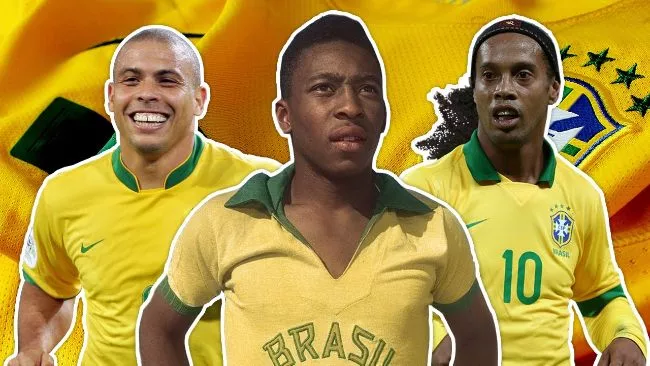Brazil is often called the spiritual home of soccer, producing legends who shaped the game with their flair, creativity, and extraordinary skill.
From Pelé, the “King of Football,” to modern icons like Neymar Jr., Brazilian players have dazzled on the world stage, bringing artistry and passion to the FIFA World Cup, Copa América, and elite clubs across Europe.
Over the decades, stars such as Ronaldo Nazário, Ronaldinho, Garrincha, Rivaldo, Romário, and Zico have carried Brazil’s legacy of excellence, making the nation synonymous with beautiful football.
Here, we celebrate the top Brazilian soccer players of all time, highlighting their impact, achievements, and unforgettable contributions.
10. Garrincha
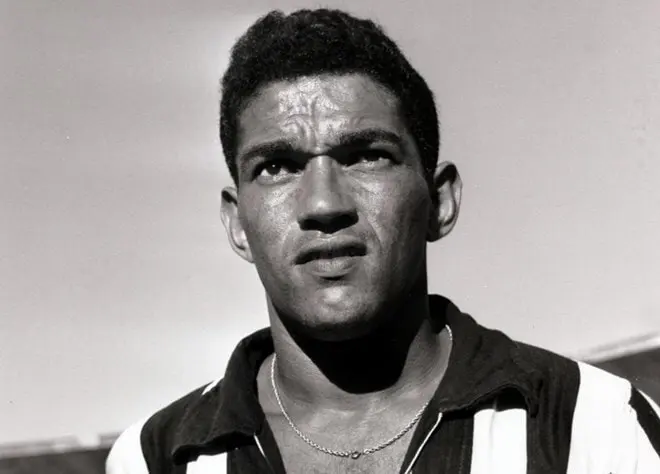
Garrincha is considered one of the greatest Brazilian footballers due to his extraordinary skill as a right winger and his pivotal role in Brazil’s golden era.
He played 50 international matches for Brazil from 1955 to 1966, scoring 12 goals and starring in three World Cups (1958, 1962, and 1966).
Most notably, Garrincha was instrumental in Brazil’s victories in the 1958 and 1962 FIFA World Cups.
In the 1962 tournament, with Pelé injured, he took the lead and delivered a dominating performance, becoming the first player to win the Golden Ball (best player), Golden Boot (top scorer), and the World Cup all in the same tournament.
At the club level, Garrincha spent the bulk of his career at Botafogo, playing 581 matches and scoring 232 goals.
He helped Botafogo win three Campeonato Carioca titles (1957, 1961, 1962) and was loved by fans for his dazzling dribbling, creativity, and unique style.
Brazil never lost a match when Garrincha and Pelé played together, cementing their status as national icons. Praised as one of the greatest dribblers in history, he was nicknamed “Alegria do Povo” (People’s Joy) and “Anjo de Pernas Tortas” (Bent-Legged Angel) due to his crooked legs and joyful playstyle.
9. Neymar Jr.

Neymar has scored over 480 senior career goals and provided more than 270 assists across both club football for teams like Santos, FC Barcelona, Paris Saint-Germain (PSG), and Al-Hilal, and for the Brazil national team.
As Brazil’s all-time leading goalscorer with 79 goals in 128 international appearances, he surpassed national legend Pelé’s record in 2023, further cementing his status among Brazil and global football entities.
Key achievements include winning the 2015 UEFA Champions League, the Copa del Rey, and multiple La Liga titles with FC Barcelona. Neymar also secured domestic league titles with Paris Saint-Germain in Ligue 1 and achieved glory in the 2011 Copa Libertadores with Santos.
Neymar’s peak years were marked by his inclusion in elite attacking trios, such as the “MSN” trio at Barcelona with Messi and Suárez, where they combined for a record 122 goals in one season.
He won the treble with Barcelona (La Liga, Copa del Rey, Champions League) in 2015 and was the Champions League top scorer that season with 10 goals.
Neymar is also celebrated for leading Brazil to Olympic gold at Rio 2016, after capturing the Confederations Cup Golden Ball in 2013 and delivering standout performances in World Cups and Copa América tournaments.
Aside from his goal scoring, Neymar is known for his creativity, impressive dribbling, and playmaking ability, making him a constant threat.
He has been recognized with personal honors, including multiple UEFA Champions League Squad of the Season selections, FIFA FIFPro World XI appearances, and the 2011 Puskás Award for best goal.
8. Cafu
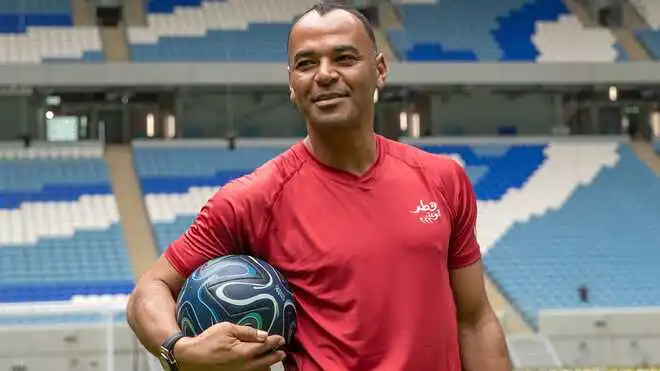
Cafu, born Marcos Evangelista de Morais, is regarded as one of the greatest right-backs and captains in football history, known for his pace, stamina, and attacking runs from the flank.
He is the most-capped Brazilian player of all time, with 142 appearances, and participated in four consecutive FIFA World Cups (1994, 1998, 2002, and 2006).
Cafu is the only player to appear in three consecutive World Cup finals, winning in 1994 and 2002, captaining the latter.
Alongside centre-back Lúcio, he anchored Brazil’s defense in the 2002 World Cup, contributing to their title-winning campaign.
At club level, Cafu had storied spells with São Paulo, Roma, and AC Milan, winning several domestic league titles and continental trophies, including the UEFA Champions League with Milan in 2007.
He won the Copa Libertadores twice with São Paulo and the UEFA Cup Winners’ Cup with Zaragoza.
Internationally, Cafu secured two Copa América titles (1997, 1999) and won the FIFA Confederations Cup in 1997, earning him recognition for his leadership, endurance, and commitment.
He was named South American Footballer of the Year in 1994, included in the FIFA 100 greatest living players by Pelé, and featured in multiple World XI teams.
7. Socrates
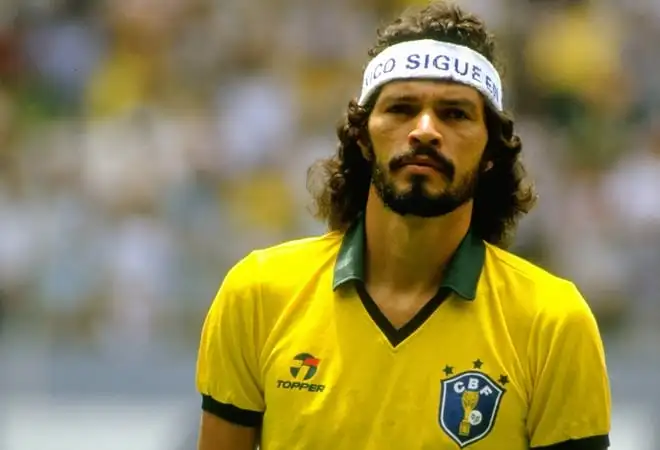
Sócrates is celebrated as one of Brazil’s greatest midfielders and a symbol of intelligence and artistry in football.
Playing primarily as a central or attacking midfielder, Sócrates combined elegant technical ability, superb vision, and precise passing with physical strength and goal-scoring prowess.
His playing style was characterized by intelligent game reading, two-footed skill, powerful long shots, and unique moves like the “no-look” back-heel pass.
Standing tall at 1.92 m, he was also strong in aerial duels.
Sócrates earned 60 caps for Brazil, scoring 22 goals, and captained the national team at the iconic 1982 FIFA World Cup, widely regarded as one of the greatest teams ever despite not winning the tournament.
At the club level, he is best remembered for his time at Corinthians, where he scored 172 goals in 297 matches and led the team as a revered captain.
His leadership extended beyond the pitch, as he was deeply involved in political activism, famously leading the “Democracia Corinthiana” movement against Brazil’s military dictatorship during the 1980s, combining his intellectual pursuits (he was a medical doctor) with football and social causes.
Individually, Sócrates was South American Footballer of the Year in 1983 and is included in Pelé’s FIFA 100 list of the greatest living players.
6. Rivaldo
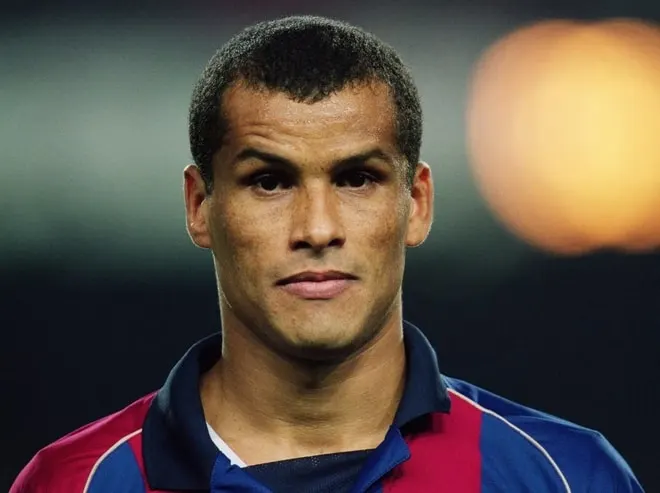
Rivaldo is widely considered one of Brazil’s greatest footballers, known for his creativity, technical skill, and powerful striking ability.
He was a key player in Brazil’s 1998 World Cup runner-up team and played a vital role in their victorious 2002 World Cup campaign, scoring five goals and earning a spot in the FIFA World Cup All-Star Team in both tournaments.
At club level, Rivaldo’s most notable years were at Barcelona, where he scored 130 goals in 157 matches and won two La Liga titles (1998 and 1999) and the Copa del Rey in 1998.
He is celebrated for some of the greatest moments in football, including a stunning last-minute bicycle kick against Valencia in 2001 that qualified Barcelona for the Champions League.
Rivaldo also won the UEFA Champions League and Coppa Italia with AC Milan in the 2002-03 season.
Known for his exceptional free kicks, precise passes, and ability to both score and assist, Rivaldo earned the Ballon d’Or and FIFA World Player of the Year awards in 1999.
5. Romário
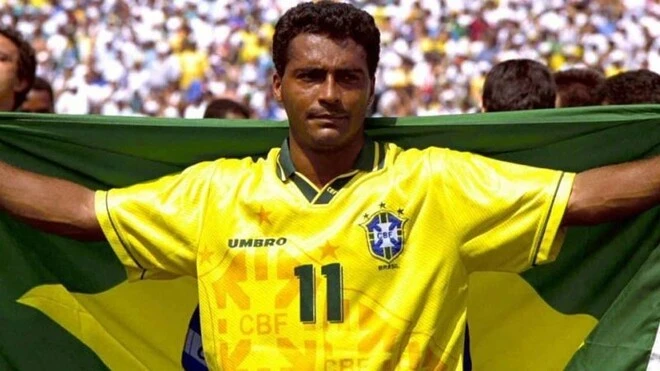
Romário is one of the few players to have scored 100 goals for three different clubs: PSV Eindhoven, Barcelona, and Vasco da Gama.
Romário was a key figure in Brazil’s 1994 FIFA World Cup-winning team, where he scored five crucial goals and was awarded the Golden Ball as the tournament’s best player.
He was also named FIFA World Player of the Year in 1994, cementing his status at the pinnacle of world football.
At the club level, Romário shone in Europe with PSV Eindhoven, winning three Eredivisie titles.
He then moved to Barcelona and instantly made an impact by finishing as the top scorer with 30 goals in 33 La Liga matches in his debut season, helping them win the league title.
Later, he had successful spells back in Brazil with Vasco da Gama and Flamengo, where he won the Brazilian league title, Copa Mercosur, and was top scorer multiple times.
Known for his sharp movement inside the box, clinical one-on-one finishing, and ability to score spectacular goals, Romário’s style was a mixture of street-smart improvisation and precise technique.
Internationally, Romário earned 70+ caps for Brazil, scoring 55 official goals, and achieved success beyond the 1994 World Cup with a silver medal and top scorer award at the 1988 Olympics, and winning the 1989 Copa América by scoring the only goal in the final.
4. Zico
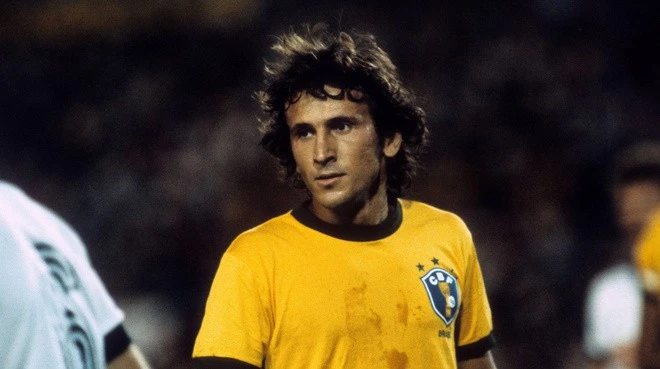
Zico is celebrated as one of Brazil’s greatest footballers and a legendary attacking midfielder known for his technical brilliance, vision, and clinical free-kick ability.
He scored 48 goals in 71 appearances for the Brazilian national team, making him the fifth-highest scorer in Brazil’s history, and represented Brazil in three World Cups (1978, 1982, 1986).
Despite never winning a World Cup, his performances in those tournaments, especially the 1982 squad widely regarded as one of the best teams ever, made him an iconic figure in Brazilian football.
At the club level, Zico’s most notable tenure was with Flamengo, where he scored a club record 508 goals in 731 matches, leading the team to multiple titles, including four Brazilian league championships, seven Campeonato Carioca titles, the 1981 Copa Libertadores, and the Intercontinental Cup the same year.
His skill in free kicks and passing earned him the nickname “White Pelé,” and Pelé himself regarded Zico as the closest player to his style.
Zico’s legacy extends beyond his stats; he revolutionized the playmaking role, blending creative flair with goal-scoring efficiency. He won South American Footballer of the Year twice (1981 and 1983) and was included in the FIFA 100 list of the greatest living players.
3. Ronaldinho Gaúcho
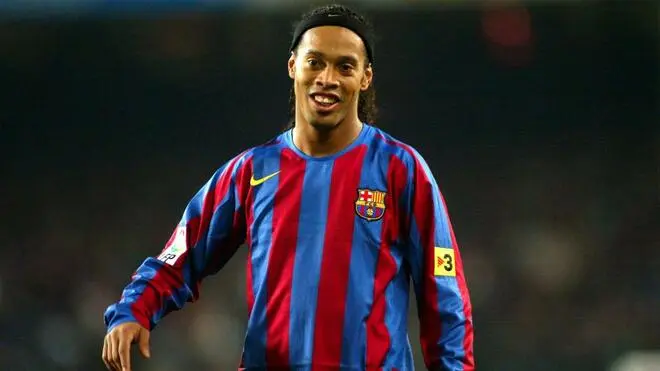
Ronaldinho Gaúcho is widely regarded as one of the most talented and joyful footballers in history, known for his dazzling skill, creativity, and flair on the pitch.
Over a career spanning more than a decade, Ronaldinho made 853 club and international appearances, scoring 328 goals with a remarkable average of 0.38 goals per game.
He won two FIFA World Player of the Year awards (2004, 2005) and the Ballon d’Or in 2005, highlighting his status as the world’s top player during his peak years.
Ronaldinho’s most famous club spell was at FC Barcelona, where he played from 2003 to 2008, scoring 94 goals in 207 appearances and leading the club to two La Liga titles (2004–05, 2005–06) and the 2005–06 UEFA Champions League crown.
Renowned for his incredible dribbling, no-look passes, and audacious tricks, Ronaldinho was the embodiment of joyful, attacking football.
He also achieved success with Paris Saint-Germain, AC Milan, Flamengo, and Atlético Mineiro, winning numerous domestic and continental trophies, including the Copa Libertadores with Atlético Mineiro in 2013.
Internationally, Ronaldinho earned 97 caps for Brazil, scoring 33 goals and winning the 2002 FIFA World Cup, the 1999 Copa América, and the Confederations Cup twice.
2. Ronaldo Nazário

Ronaldo Luís Nazário de Lima is widely regarded as one of the greatest strikers of all time, essentially making him one of the football’s GOATs.
His career was marked by extraordinary goal-scoring ability, speed, and technical skill that redefined the striker role.
Ronaldo scored 62 goals in 98 appearances for Brazil, making him the second-highest goalscorer for his national team.
He played an essential part in Brazil’s World Cup victories in 1994 and 2002, winning the Golden Boot and Golden Ball in 2002 as the top scorer and best player of the tournament.
Ronaldo also earned the FIFA World Player of the Year award three times (1996, 1997, 2002) and two Ballon d’Or titles (1997, 2002), recognizing his dominance at the highest level.
At the club level, Ronaldo’s career featured standout spells at Cruzeiro, PSV Eindhoven, Barcelona, Inter Milan, Real Madrid, AC Milan, and Corinthians.
He scored over 300 club goals despite suffering devastating knee injuries, showcasing remarkable resilience with a successful comeback.
At Barcelona, he scored 47 goals in 49 matches in one season, and at Real Madrid, he was part of the famous Galácticos team, winning La Liga and the Intercontinental Cup.
His blend of explosive pace, powerful shot, and close control made him nearly unstoppable in his prime.
1. Pelé
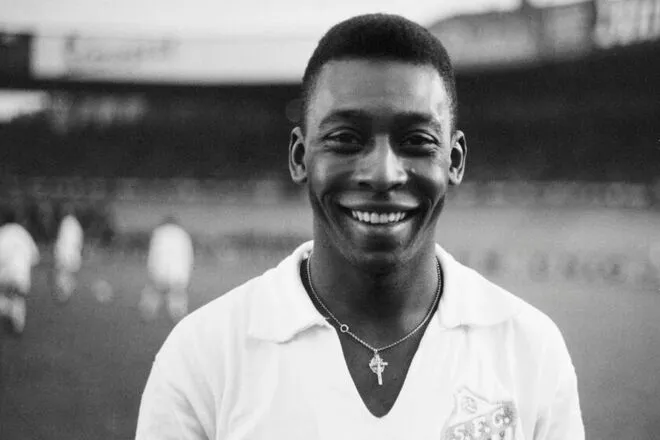
Pelé is widely regarded as the greatest footballer of all time, renowned for his prolific goal-scoring, versatility, and impact on the global game.
Over his career, Pelé scored an astounding total of 1,281 goals in 1,363 games, including official and unofficial matches, a record recognized by FIFA and the Guinness World Records.
In official club competitions, he scored 643 goals in 659 appearances for Santos, where he led the club to multiple Brazilian championships and two Copa Libertadores titles.
He also scored 77 goals in 92 international appearances for Brazil, holding the national team’s top scorer record for over six decades until Neymar surpassed him in 2023.
Pelé is the only player to have won three FIFA World Cups (1958, 1962, and 1970), debuting as the youngest World Cup player at 17 and becoming the youngest to score and win the tournament.
He scored 12 World Cup goals, including a crucial brace in the 1958 final that announced his arrival on the world stage.
Beyond his goal tallies, Pelé was known for his extraordinary skill set by combining speed, strength, intelligence, and creativity, and his ability to perform in clutch moments.
His influence & popularity helped popularize football worldwide, elevating Brazil’s style and success during its golden era.
